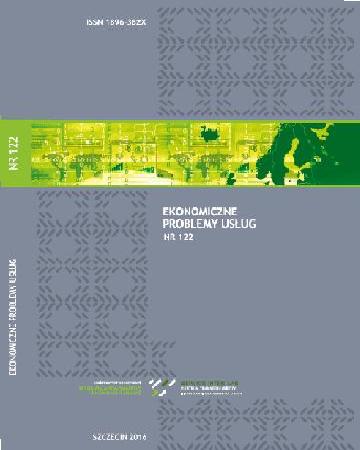
ISSN: 1896-382X
eISSN: 2353-2866
OAI
DOI: 10.18276/epu.2018.131/2-10



Lista wydań /
nr 131 (2) 2018
Electronic feedback as a tool for changing households energy consumption
(ELEKTRONICZNE INFORMACJE ZWROTNE JAKO NARZĘDZIE ZMIANY ZUŻYCIA ENERGII W GOSPODARSTWACH DOMOWYCH)
| Autorzy: |
Joanna
Kos-Łabędowicz
Uniwersytet Ekonomiczny w Katowicach Wydział Ekonomii Katedra Międzynarodowych Stosunków Ekonomicznych |
| Słowa kluczowe: | zużycie energii zachowania energetyczne sektor gospodarstw domowych elektroniczne informacje zwrotne inteligentne liczniki UE |
| Data publikacji całości: | 2018-05-12 |
| Liczba stron: | 9 (107-115) |
| Klasyfikacja JEL: | Q40 Q48 Q58 |
Abstrakt
Zmniejszenie zużycia energii i jej wpływ na środowisko są jednym z priorytetowych celów Unii Europejskiej. Szczególne znaczenie dla osiągniecia tego celu mają działania skierowane na zwiększenie efektywności energetycznej w sektorze mieszkaniowym. W artykule przedstawiono narzędzia służące informowaniu konsumentów o zużyciu energii w domach oraz przegląd literatury z tego zakresu. Przegląd prowadzonych w ostatnich latach badań wskazuje na to, że przekazywanie informacji o zużyciu energii wpływa na zmianę zachowań. Nie mniej konieczne są inne działania ukierunkowane na angażowanie konsumentów oraz ich edukowanie w temacie możliwych sposobów redukcji zużycia energii
Pobierz plik
Plik artykułu
Bibliografia
| 1. | Bradley, P., Coke, A., Leach, M. (2016). Financial incentive approaches for reducing peak electricity demand, experience from pilot trials with a UK energy provider. Energy Policy, 98, 108–120. DOI: 10.1016/j.enpol.2016.07.022. |
| 2. | Broberg, T., Persson, L. (2016). Is our everyday comfort for sale? Preferences for demand management on the electricity market. Energy Economics, 54, 24–32. DOI: 10.1016/j.eneco.2015.11.005. |
| 3. | Buchanan, K., Russo, R., Anderson, B. (2015). The question of energy reduction: The problem(s) with feedback. Energy Policy, 77, 89–96. DOI: 10.1016/j.enpol.2014.12.008. |
| 4. | Burchell, K., Rettie, R., Roberts, T. (2016). Householder engagement with energy consumption feedback: the role of community action and communications. Energy Policy, 88, 178–186. DOI: 10.1016/j.enpol.2015.10.019. |
| 5. | Carroll, J., Lyons, S., Denny, E. (2014). Reducing household electricity demand through smart metering: The role of improved information about energy saving. Energy Economics, 45, 234–243. DOI: 10.1016/j.eneco.2014.07.007. |
| 6. | Chen, V., Delmas, M., Locke, S., Singh, A. (2017). Information strategies for energy conservation: A field experiment in India. Energy Economics, 68, 215–227. DOI: 10.1016/j.eneco.2017.09.004. |
| 7. | Dulleck, U., Kaufmann, S. (2004). Do customer information programs reduce household electricity demand? The Irish program. Energy Policy, 32, 1025–1032. DOI: 10.1016/S0301-4215(03)00060-0. |
| 8. | Dz. U. (2016). Ustawa o efektywności energetycznej z 20 maja 2016 roku, Dz. U. 2016, nr 94, poz. 551. |
| 9. | EC (2017). Welcome to the EU ENERGY STAR program. Retrieved from: https://www.eu-energystar.org/index.html (3.01.2018). |
| 10. | EC (last update 22.01.2018). EU climate action. Retrieved from: https://ec.europa.eu/ clima/citizens/eu_en (22.01.2018). |
| 11. | EU (2012). Directive 2012/27/EU of the European Parliament and of the Council of 25 October 2012 on energy efficiency, amending Directives 2009/125/EC and 2010/30/EU and repealing Directives 2004/8/EC and 2006/32/EC Text with EEA relevance. Retrieved from: http://eur-lex.europa.eu/legal-content/EN/TXT/?uri=CELEX:32012L0027 (5.01.2018). |
| 12. | Eurostat (2017). Energy consumption in households. Retrieved from: http://ec.europa.eu/euro stat/statistics-explained/index.php/Energy_consumption_in_households (3.01.2018). |
| 13. | Foulds, Ch., Robison, R., Macrorie, R. (2017). Energy monitoring as a practice: Investigating use of the iMeasure online energy feedback tool. Energy Policy, 104, 194–202. DOI: 10.1016/j.enpol.2017.01.055. |
| 14. | Gölz, S., Hahnel, U. (2016). What motivates people to use energy feedback systems? A multiple goal approach to predict long-term usage behaviour in daily life. Energy Research & Social Science, 21, 155–166. DOI: 10.1016/j.erss.2016.07.006. |
| 15. | Hargreaves, T., Nye, M. & Burgess, J. (2013). Keeping energy visible? Exploring how householders interact with feedback from smart energy monitors in the longer term. Energy Policy, 52, 126–134. DOI: 10.1016/j.enpol.2012.03.027. |
| 16. | Kendel, A., Lazaric, N., Maréchal, K. (2017). What do people ‘learn by looking’ at direct feedback on their Energy consumption? Results of a field study in Southern France. Energy Policy, 108, 593–605. DOI: 10.1016/j.enpol.2017.06.020. |
| 17. | Kos-Łabędowicz, J. (2015). Internet jako źródło informacji w decyzjach nabywczych konsumenta. Warszawa: Wydawnictwo C.H. Beck. |
| 18. | Krishnamurti, T., Schwartz, D., Davis, A., Fischhoff, B., Bruine de Bruin, W., Lave, L., Wang, J. (2012). Preparing for smart grid technologies: A behavioral decision research approach to understanding consumer expectations about smart meters. Energy Policy, 41, 790–797. DOI:10.1016/j.enpol.2011.11.047. |
| 19. | Lynham, J., Nitta, K., Saijo, T., Tarui, N. (2016). Why does real-time information reduce energy consumption? Energy Economics, 54, 173–181. DOI: 10.1016/j.eneco.2015.11.007. |
| 20. | Murphy, L. (2014). The influence of energy audits on the energy efficiency investments of private owner-occupied households in the Netherlands. Energy Policy, 65, 398–407. DOI: 10.1016/j.enpol.2013.10.016. |
| 21. | Oltra, Ch., Boso, A., Espluga, J., Prades, A. (2013). A qualitative study of users' engagement with real-time feedback from in-house energy consumption displays. Energy Policy, 61, 788–792. DOI: 10.1016/j.enpol.2013.06.127. |
| 22. | Prandecki, K. (2014). Teoretyczne podstawy zrównoważonej energetyki. Studia Ekonomiczne, 166, 238–248. |
| 23. | Ramos, A., Gago, A., Labandeira X., Linares, P. (2015). The role of information for energy efficiency in the residential sector. Energy Economics, 52, 17–29. DOI: 10.1016/j.eneco.2015.08.022. |
| 24. | Schleich, J., Faure, C., Klobasa, M. (2017). Persistence of the effects of providing feedback alongside smart metering devices on household electricity demand. Energy Policy, 107, 225–233. DOI: 10.1016/j.enpol.2017.05.002. |
| 25. | Schleich, J., Klobasa, M., Gölz, S., Brunner, M. (2013). Effects of feedback on residential electricity demand – Findings from a field trial in Austria. Energy Policy, 61, 1097–1106. DOI: 10.1016/j.enpol.2013.05.012. |
| 26. | WCED – World Commission on Environment and Development (1987). Our Common Future. Suffolk. Oxford University Press. |
| 27. | Weber, S., Puddu, S., Pacheco, D. (2017). Move it! How an electric contest motivates households to shift their load profile. Energy Economics, 68, 255–270. DOI: 10.1016/j.eneco.2017.10.010. |
| 28. | Zygierewicz, A. (2016). Implementation of the Energy Efficiency Directive (2012/27/EU): energy efficiency obligation schemes: European implementation assessment. Brussels: European Parliament. |